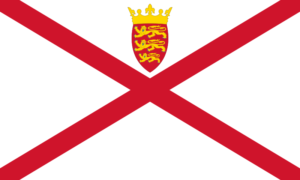Jersey is a small island nation off the Normandy coast of France. It was invaded and settled by the Vikings in the 9th century. At times it was part of the Duchy of Normandy. The Duke of Normandy owned a large estate on the island.
During World War II, Jersey was occupied by German forces. Jersey is now a British Crown Dependency. However, it is not part of the UK or the European Union. Britain is responsible for Jersey’s defense and diplomatic relations.
| Capital | Saint Helier |
| Population | 103,267 (Source: 2023 wikipedia) |
| Major Cities | Saint Helier (capital), Newark, Jersey City, Trenton, Atlantic City, and Princeton |
| Borders | Pennsylvania and New York in the north, Pennsylvania in the west, Delaware and Delaware Bay in the south, the Atlantic Ocean in west, and Long Island (a part of New York) in the east |
| Gross Domestic Product (GDP) | $55,324 (2019 wikipedia) |
| Currency | British pound (GBP); note – there is also a Jersey pound |

Jersey Major Industries: tourism, banking and finance, dairy
Jersey Agricultural Products: potatoes, cauliflower, tomatoes; beef, dairy products
Jersey Natural Resources: arable land
Jersey Major Exports: light industrial and electrical goods, foodstuffs, textiles
Jersey Major Imports: machinery and transport equipment, manufactured goods, foodstuffs, mineral fuels, chemicals
Total Size of Jersey: 116 sq km (source: 2022 The world factbook)
Geographical Low Point of Jersey: Atlantic Ocean 0 m
Geographical High Point of Jersey: unnamed location 143 m
Climate of Jersey: Temperate; mild winters and cool summers
General Terrain of Jersey: gently rolling plain with low, rugged hills along north coast
World Region or Continent of Jersey: Europe
Geographical Coordinates: 49 15 N, 2 10 W
Jersey Government Type: NA
Jersey Nationality: Channel Islander(s)
Jersey National Holiday: Liberation Day, 9 May (1945)
Jersey Independence: none (British crown dependency)
Jersey National Symbol: Jersey cow
Jersey National Anthem or Song: Isle de Siez Nous (Island Home)
Jersey Languages Spoken: English 94.5% (official), Portuguese 4.6%, other 0.9% (2001 census)
Jersey Religions: Anglican, Roman Catholic, Baptist, Congregational New Church, Methodist, Presbyterian
Jersey has a population of about 107,800, with 46% of her population born on the island. The other largest ethnic groups on the island are 33% British, 8% Portuguese, 3% Polish and less than 3% Irish.
Jersey is not duty free. You are subject to income tax, customs duty (3% Goods and Services Tax (GST)) payable on certain goods and other taxes and revenues, but no VAT is charged in Jersey.
Jersey is the only place you’ll see pound notes. The currency is the pound, but the island also has its own Jersey pound.
Jersey has one of the highest tides in the world. At low tide twice a day, the island nearly doubles in size and is filled with miles of sandy beaches and rock pools. It’s a perfect playground for children, and an ideal place for the little sea creatures that thrive in the warm, shallow waters.
Jersey Royal potatoes are accorded a higher status under the Protected Designation of Origin. This means no one can steal the name from another product
Jersey cows are bred for the bounty of buttermilk, not beef. Raised all over the world, he is now the second most popular breed of cattle.
The island is home to red squirrels, and even if there are no mainland squirrels in the next 30-35 years, this may be the only place in the British Isles where you might see them.
Many old Jersey homes have a witch seat made of stone that protrudes from the gable of the house. The islanders believed that providing a chair for passing witches to rest would keep them from falling prey to an evil spell.
Jersey’s original airport was on the beach at St Aubin’s Bay.
Jersey was a favorite holiday destination for communist father Karl his Marx. Prehistoric forests are buried beneath the beaches of Saint-Ouen Bay.
The people of Jersey and Guernsey believe they are descended from fairies known on the islands as ‘pooks’ (pronounced ‘pooks’). The last reported sighting of fairies was in his early 20th century.
The Channel Islands were the only area of the British Isles occupied by German forces during World War II.

